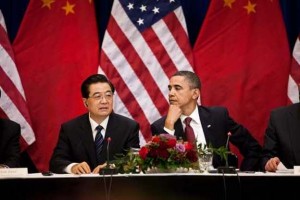As expected, the U.S. filed a major trade complaint against China today, one that accuses the Asian giant of illegally dumping subsidized auto parts into the U.S. market – a move that has cost potentially tens, even 100s of thousands of U.S. jobs.
The move came just hours after China filed its own complaint with the World Trade Organization over punitive tariffs the Obama Administration had enacted earlier this year to compensate for China’s alleged dumping of tires. The tariffs cover more than 30 different product categories as diverse as kitchen appliances, chemicals and wind generation towers.
The conflicting WTO complaints threaten to heat up the growing battle between two major global trading partners. But the issue is also becoming a point of debate between President Barack Obama as he competes for re-election and his Republican challenger Mitt Romney.
The White House claims that China has supported the growth of its export market with the use of subsidies that totaled $3 billion between 2009 and 2011 alone. Between 2001 and 2010, the administration emphasized, about half the jobs in the U.S. auto parts sector were lost, while China’s employment surged seven-fold.
“Those subsidies directly harm working men and women on the assembly line in Ohio and Michigan and across the Midwest. It’s not right; it’s against the rules; and we will not let it stand,” the President declared during a stop in Cincinnati.
The timing of the WTO following – the Obama Administration’s second such action this year – was highlighted by candidate Romney, who declared it “too little, too late,” in an e-mailed statement insisting that as president the former Massachusetts governor would “level the playing field.”
In turn, during his speech, Pres. Obama chided his challenger as a “pioneer… in the business of outsourcing jobs to countries like China” during his time as head of the hedge fund Bain Capital.
The auto industry is clearly caught up in the crosshairs of the latest trade kerfuffle. While specific numbers might be a topic of debate it is generally agreed that there has been a significant shift of jobs from the U.S. to China in the auto parts sector. And still more jobs could move to the Asian nation if China can start selling fully assembled vehicles in the U.S., as well. At this point, only a very small number of Chinese-made automobiles are being imported by California battery-car start-up Coda.
Ironically, it’s the U.S. that dominates there. Far more vehicles are being shipped from the U.S. to China. But to counter the tariffs added after the tire-dumping decision the Chinese added new duties on American-made vehicles — the stiffest on products built by Detroit’s Big Three. The Cadillac CTS and Buick Enclave, for example, are subject to 22% duties, the Jeep Wrangler and Grand Cherokee models 15%. The American-made Acura TL sedan, on the other hand, faces only a 4.1% mark-up.
The Chinese are clearly concerned about the latest U.S. action, especially in light of the slowdown in their domestic auto market. Making matters worse has been the slowdown of automotive sales in Europe and the concurrent decline in parts imports from China. If the Chinese lose in the latest trade battle they could face serious issues and the possibility of declining employment in the automotive sector after a decade of explosive growth.

